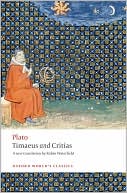

 |

|

The average rating for Timaeus and Critias based on 2 reviews is 4 stars.
Review # 1 was written on 2018-10-03 00:00:00 Noushine Sefiddashti Noushine SefiddashtiDone, phew !! Well this was a tough read and no mistake for such a small book. I had hoped there was more Greek myths in the content, especially given that part of it was supposed to be about Atlantis. Unfortunately there was little mythology involved. Whether it was unfinished on purpose or else part of the book has been lost over the years (centuries) who knows, but the end result is that of the 3 monologues this book was intending to show case, only the first survives in its entirety. This first monologue of almost 90 pages is Timaeus' contribution to this book. At times this monologue was, shall we say a little boring, at others it was remarkably modern thinking regarding the composition of matter, for a book written almost 2500 years old. The second part, to be a monologue by Critias, regarding the Fall of Atlantis (to me probably the most interesting) only lasts a few pages and then that's it, just as it's about to get interesting, doh ! A Platonic text that influenced and continues to influence Western thought and doctrine, hmmm maybe, a difficult book to read with some interesting ideas, well yes. Am I pleased I read it, I think that has to be a yes as well. |
Review # 2 was written on 2019-01-01 00:00:00 Diana Pierce Diana PierceThis is how the world began according to Plato. Out of Chaos rose the stars and planets, rose man and the four elements'fire, air, water, and earth'based on four of the five convex regular polyhedra (the Platonic solids). All was created by a Demiurge looking to an eternal, perfect model. We hear how the senses function (for example, how we see: by sending out our own fire through our eyes and having it react with the fire reflected off objects), and how the human body was purposefully designed (the head, which contains the purest part of the soul, is separated off from other, viler parts). It is worth reading Timaeus just for the creativity and historical importance of Plato's imaginative explanations. The book is in traditional dialogic form and it is unfinished. Four characters are present: Socrates, Timaeus, Critias, and another. Socrates takes on a minor role at the beginning, questioning the group about their intended stories, but then Timaeus proceeds to give Plato's cosmogony in a virtually unbroken monologue. Critias follows up with a story of the legendary Atlantis, but only manages to get started before the text is cut off. The introduction and editor's notes offer indispensable contextual information. |
CAN'T FIND WHAT YOU'RE LOOKING FOR? CLICK HERE!!!